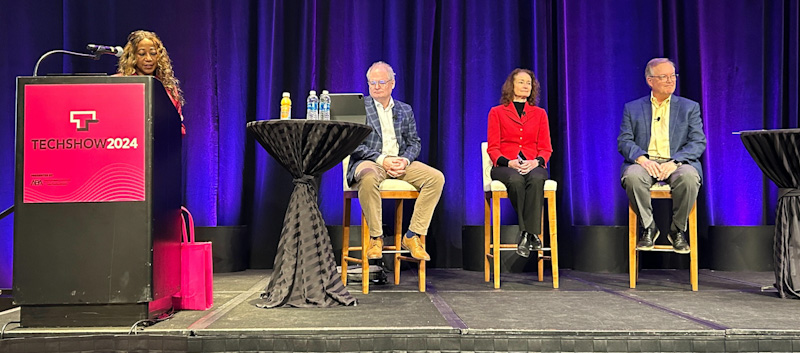How could generative AI radically transform the legal industry?

Cynthia Thomas (from left), Dan Pinnington, Jayne Reardon and Reid Trautz participated in the "Your Future Starts Here: Technology and the Next Era of Legal Practice" panel at the ABA Techshow 2024 on Thursday. (Photo by Victor Li)
The more things change, the more they stay the same. Until now—possibly. That was the main theme of the opening plenary session of the ABA Techshow 2024.
Entitled: “Your Future Starts Here: Technology and the Next Era of Legal Practice,” the panel comprised Daniel Pinnington, president and CEO of LawPro; Jayne Reardon, a partner and deputy general counsel at FisherBroyles; and Reid Trautz, senior director of the American Immigration Lawyers Association’s Practice & Professionalism Center. It was moderated by Cynthia Thomas, owner of PLMC & Associates and a 2024 ABA Techshow co-chair.
Noting that the first incarnation of Techshow happened in 1985 and focused on document automation, the panel pointed out that it is still a major theme at this year’s show.
Other former cutting-edge tools, such as email, voice recognition and cloud computing, are similarly still part of the current agenda. Most notably, practice or case management software was first mentioned in 2000—however, according to the ABA’s 2023 Practice Management TechReport, “53% and 63% of respondents [had responded] that they had such software” at their law firms.
“Lawyers are slow to adopt technology—that’s not news to anyone,” Pinnington said. “But that shows there’s still an opportunity because for those lawyers that want to be more efficient, communicative and profitable, there’s space in the market to do it.”
However, one piece of technology has seemingly bucked this trend and caused quicker and more widespread adoption within the legal industry than any of its predecessors.
“In my 37 years in the profession, I have never seen technology come as fast and quickly and as fully as generative AI,” Trautz said. “We need to decide whether to get on board with it or try to avoid it, but I don’t think you can avoid it.”
The panel agreed that the transformative effect of generative artificial intelligence could have profound effects within the legal profession. Reardon pointed out that generative AI tools are already leading to job eliminations in other fields, and Trautz predicted that the legal industry would not be immune.
“For instance, bigger firms are highly leveraged where associates do a lot of the work,” he said. “We’ll see it more going forward, but fewer associates will be needed to do that work because generative AI is giving us very good initial results.”
Follow along with the ABA Journal’s coverage of the ABA Techshow 2024 here.
Reardon argued that the prevalence of generative AI tools has caused a shift in the way that lawyers and legal professionals think.
“It strikes me that going back to 1985 and before, what we’ve always focused on was doing the same thing faster,” said Reardon, formerly the executive director of the Illinois Supreme Court Commission on Professionalism and a 2021 ABA Journal Legal Rebel. “This is a different moment, where there is the opportunity for creation and doing things completely differently than in the past.”
Panelists maintained that generative AI could lead to all sorts of sea changes, including helping to bridge the access-to-justice gap; forcing courts and lawyers to guard against deepfakes and other false evidence; and, most notably, killing the billable hour.
“Generative AI is going to have an impact on the billable hour,” Trautz said. “If what used to take me and an associate and paralegal 10 or 20 hours now takes me only two or four, can I generate enough new clients to make up for that? Or should I go to a flat fee?”
Trautz pointed out that in immigration, flat fees are usually the norm and didn’t see why that couldn’t be exported to other practice areas.
Pinnington wasn’t as bullish, noting that the billable is “too easy” and “built into the DNA of many operations.”
Nevertheless, he agreed that generative AI will bring about some level of change within the legal industry as lawyers start to realize they can do the same work in a “fraction of a fraction of the time it used to take them.”
Appropriately enough, after the panel discussion ended, the ABA Law Practice Division presented the 2024 James I. Keane Award recognizing innovative firms and delivery of legal services to Mathew Kerbis, founder of Subscription Attorney, a firm that offers legal advice and services to clients starting at $19.99 per month.
“Let the billable hour die!” Kerbis said, paraphrasing Kylo Ren from Star Wars: The Last Jedi. “Kill it if you have to!”



